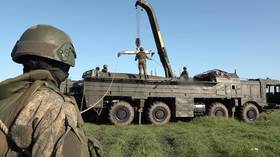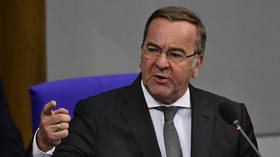US ‘concerned’ by potential Russian response to missile deployment in Germany

The US State Department has said it finds Moscow’s response to Washington’s plans to deploy nuclear missiles to Germany “concerning.”
Earlier this month, the US and Germany announced “episodic deployments” of long-range capabilities in Europe. In response, Russian Deputy Foreign Minister Sergey Ryabkov stated that Moscow will keep all options on the table if this happens.
“Any kind of rhetoric about the use or deployment of nuclear warheads is of course concerning and something we will pay close attention to,” State Department spokesman Vedant Patel told reporters during a press briefing on Thursday.
“This is something we have seen the Russians do and say, thump their chests a bit,” Patel added, declining to speculate further.
Earlier in the day, Ryabkov said that Moscow would not impose any “internal restraints” on its response to US missile deployment and seek “the broadest possible” number of options, including equipping its missile systems with nuclear warheads.
Ryabkov accused the West of using “trumped-up pretexts” and false accusations of Russian threats in order to pursue a strategy of escalation. While regrettable, this will not stop Russia from ensuring its own national security, he added.
According to a joint US-German press release dated July 10, the US “will begin episodic deployments of the long-range fires capabilities of its Multi-Domain Task Force in Germany in 2026.”
Among the weapons that could end up deployed to Germany are SM-6 anti-aircraft missiles, Tomahawk land-attack cruise missiles, and hypersonic weapons which are still in development.
Stationing these systems in Europe was banned under the 1987 Intermediate-Range Nuclear Forces (INF) Treaty, but the US unilaterally withdrew from it in 2019.
German Defense Minister Boris Pistorius has described the missile plan as a deterrent against “the Russian threat of the Iskander in Kaliningrad” and insisted that it does not amount to an escalation.
The Iskander is a short-range missile system in service since 2006. Moscow stationed several nuclear-capable batteries in the enclave of Kaliningrad in 2016, responding an increase of NATO forces in the region. They were reinforced in August 2022 by Kinzhal air-to-surface hypersonic missiles, as Finland and Sweden sought membership in the US-led bloc.













